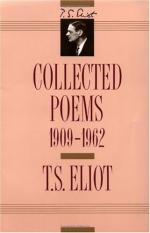|
This section contains 3,009 words (approx. 11 pages at 300 words per page) |

|
Eliot's theory of poetry falls neither into didacticism nor into the opposite heresies of imagism and echolalia. The real 'purity' of poetry—to speak in terms at once paradoxical and generic—is to be constantly and richly impure: neither philosophy, nor psychology, nor imagery, nor music alone but a significant compounding of them all.
Orthodoxy is always more difficult to state than heresy, which is the development of an isolated 'truth'; but Eliot excels at copious illustration and analysis of illustration; and his conception of poetic orthodoxy and the hierarchy of poets which he has arranged according to it may be said to have supplanted Arnold's. (pp. 160-61)
His characteristic virtue lies less in perspective than in that close study of the poetic text of which he was, in English, the inaugurator, and in the extraordinary kind of critical wit by which he compares, by virtue of a...
|
This section contains 3,009 words (approx. 11 pages at 300 words per page) |

|


